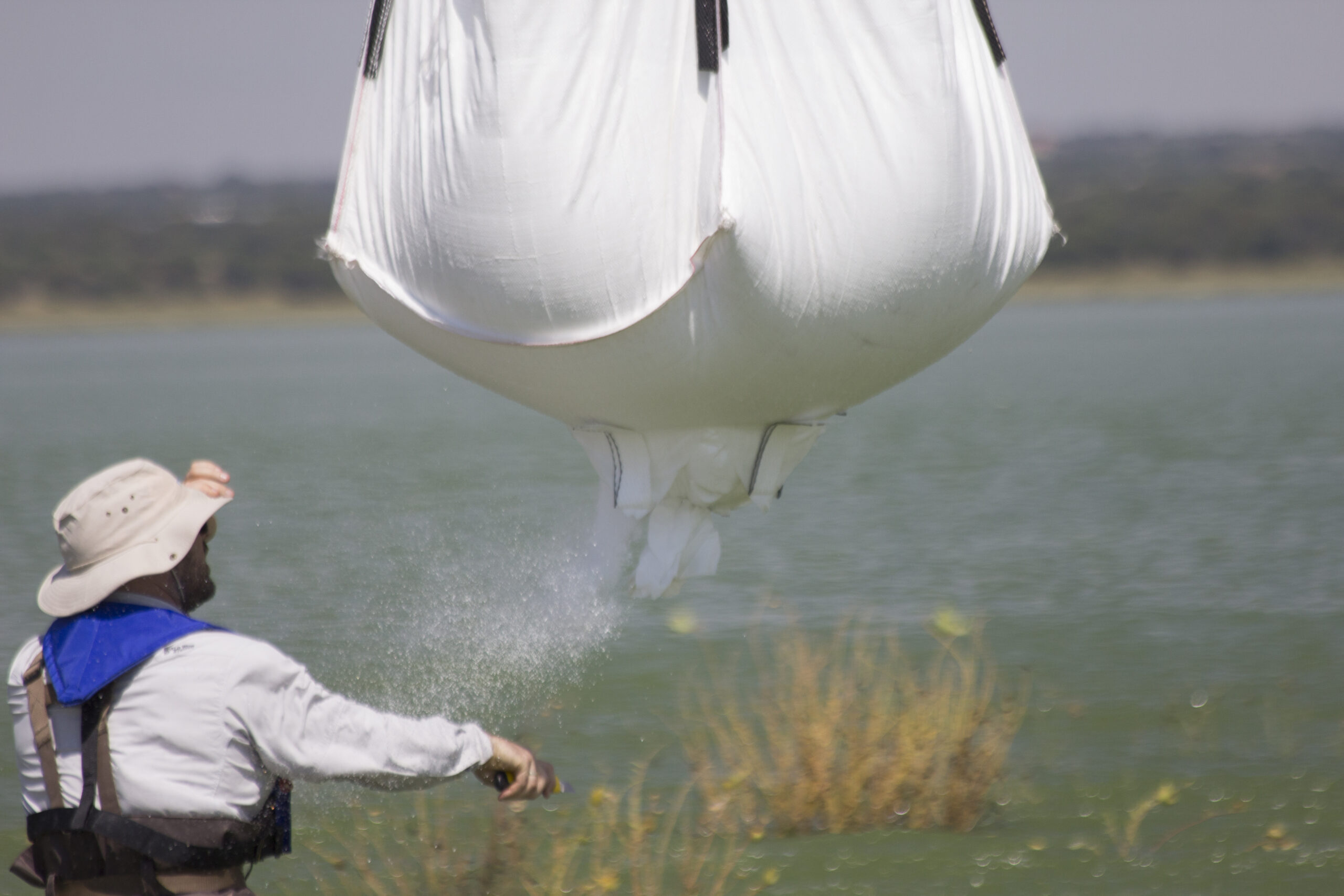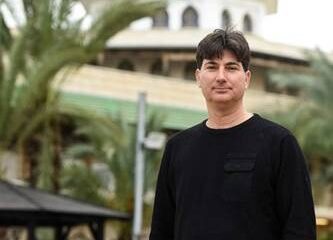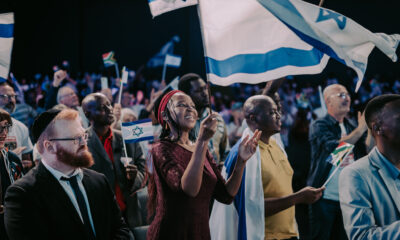
Israel

Lights, water, action – Israel makes a difference in Africa
Published
1 year agoon
Before Israeli water-tech company BlueGreen Water Technologies intervened at Setumo Dam on the Molopo River in South Africa’s North West Province in 2020, the water had become so toxic that people could no longer drink it even though it was their main water source.
It took just six months for the company to eradicate toxic algae blooms in the water. For the first time in decades, the people of Mahikeng were able to access clean drinking water, enjoy Setumo Dam as a safe water source, and unleash its potential for recreational purposes.
All this happened with full co-operation between BlueGreen Water Technologies and Sedibeng Water, the company overseen by the department of water and sanitation, demonstrating how South Africa and the African continent can open itself to Israel’s support, and how Israeli companies and government are happy to help.
“We have established good relationships with the government,” said BlueGreen Water Technologies Chief Executive Eyal Harel at the time. “It sees the problem for what it is, and is taking a long-term approach. We’re totally committed to improving water quality in South Africa, and we see the same from government.”
While Israel-haters call for Israeli assistance to be banned from the continent, it’s clear they are putting their hatred first and the interest of the people second. And in most instances, their calls fall on deaf ears, as Israel continues to make a difference in South Africa and beyond.
Israeli engagement with the African continent is, in fact, not new. It dates to the 1950s, when Israel’s first prime minister, David Ben-Gurion, looked to Africa to find support for the newly-established Jewish state.
An egalitarian attitude toward Africa was typified by the architect of Israel’s “Africa policy”, Golda Meir, who believed Israelis and Africans had much in common as they were both engaged in the process of nation building. “Like them, we had shaken off foreign rule; like them, we had to learn for ourselves how to reclaim the land, how to increase the yields of our crops, how to irrigate, how to raise poultry, how to live together, and how to defend ourselves,” she said.
Meir’s first trip to the continent was in 1958, starting in Liberia. In this country, the Gola people crowned her queen in a traditional ceremony, prompting Israeli poet Avraham Shlonsky to suggest that the Gold Coast (Ghana’s colonial name) be renamed “Golda Coast”. This is according to writer Masimba Musodza, who was born and grew up in Zimbabwe and now lives in the United Kingdom. He says Meir also toured the Victoria Falls in Zambia.
“In Meir’s wake, thousands of Israeli experts in fields such as military, police and intelligence training, agriculture, regional planning, and community work were dispatched, working in 33 countries across the continent. Many African leaders and technocrats visited Israel to see for themselves these brilliant ideas at work,” wrote Musodza in 2016.
He points out that during her tenure as foreign minister, Israel voted at the United Nations in 1962 to condemn South Africa’s apartheid policy, having obtained the support of the Knesset.
“I believe we are on the threshold of a revolution in relations between the African continent and Israel, one that takes us back to that Golden Age (Golda Age?) where this remarkable woman distinguished herself,” wrote Musodza. “She left us an enduring legacy on which to build a new relationship.”
Indeed, in recent years, relations between Israel and Africa have thrived and may even be a Golden Age of relations, as Musodza predicted back in 2016. For example, during the COVID-19 pandemic, Israel-based non-governmental organisation IsraAID assisted Eswatini (formerly known as Swaziland) to build its response to the virus, including vaccine rollout, logistics, and public education.
Israel has had an impact in numerous spheres through Mashav (Israel’s Agency for International Development Co-operation), after Meir pledged Israeli help to find solutions to severe challenges in food security, water safety and sanitation, healthcare, economic growth, community building, and the empowerment of women and education.
Private Israeli companies, start-ups, and non-profit organisations have also played a crucial role. Sivan Yaari has led the way with her organisation, Innovation: Africa, which has brought electricity and safe drinking water to more than a million people in rural Africa using Israeli innovation and technology. The organisation uses Israeli-designed and made solar panels and water-treatment systems.
Operating out of Israel, it has provided electricity and water to more than 170 communities in eight African countries. It’s clear that the organisation could assist South Africa with its energy crisis, and it is already working to solve water crises in villages across South Africa.
Backed by generous sponsors including Investec, these projects are in 37 South African villages so far. Innovation: Africa first sinks a borehole to tap groundwater in a village, and then installs a solar-powered pump, water tower, and reticulation system. It hires local villagers to assist and learn how to maintain the system. The solar panels also generate electricity for medical clinics and light for studying at night. Israeli drip-irrigation technology waters fields efficiently.
In July 2022, a four-member group from the University of the Free State took a five-day study tour on trans-boundary water and wastewater management in Israel. About a month later, a delegation of Israeli water experts arrived in South Africa to help the Tshwane municipality solve its water issues. These are examples of Israel’s long history of working with Africa’s people to improve infrastructure, services, and quality of life.
Inviting Africans to visit Israel is also a vital part of Israel’s ability to assist. As recently as February 2023, Angola sent a high-level delegation to Israel, led by the country’s minister of higher education, science, technology, and innovation, Dr Maria do Rosario Braganca.
“This is my first visit to Israel as minister of higher education, science, technology, and innovation,” said Braganca during the visit. “I would like to learn from Israel how to advance our systems in Angola. In particular, Israel has been developing education systems from pre-school to higher education in order to fulfil the goal of having more than 50% of its population achieve a university degree. We can use this knowledge in our country. It’s also important for us to see how the theme of innovation is being developed so well in Israel. We hope to enjoy the fruits of the future co-operation between Angola and Israel, particularly in the field of higher education.”
Israeli Ambassador to South Africa, Eli Belotsercovsky recently shared that from 1994 to date, about 100 South African experts have been trained in Israel, some of whom currently occupy senior positions in government.
He wrote that Israeli technical co-operation over the years in South Africa has focused on water, agriculture, and food security, and emphasised that the relationship was a real partnership, with “Israel and Africa working together to create a better world”.










